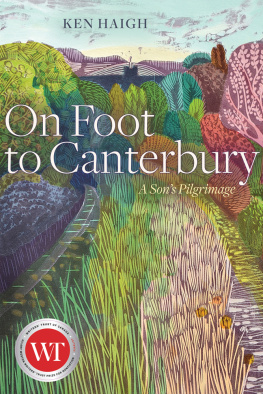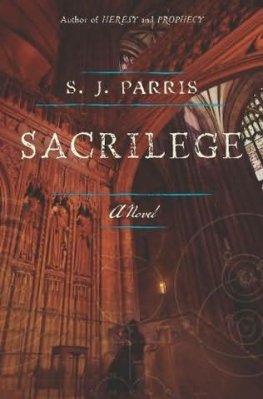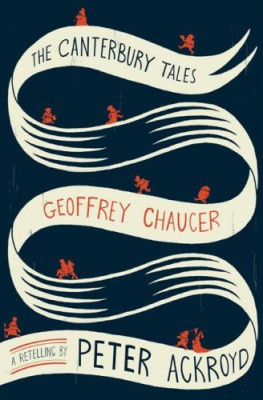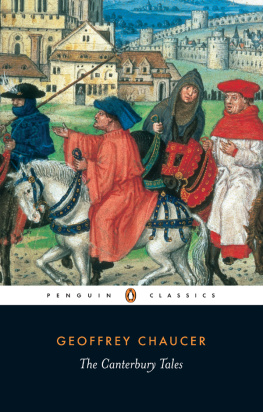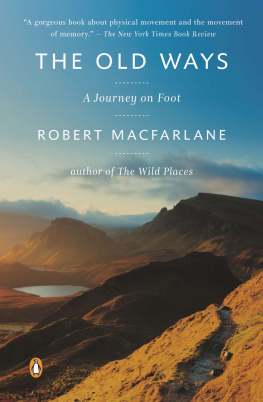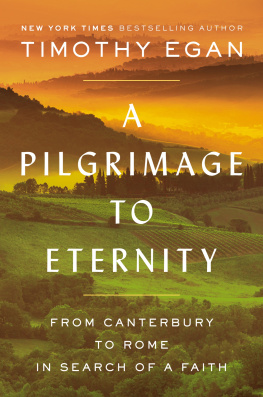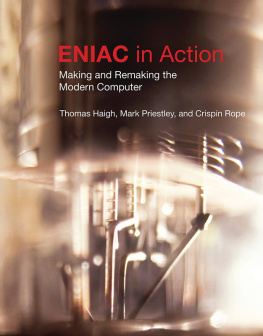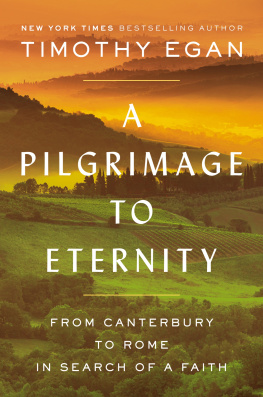

Published by
University of Alberta Press
116 Rutherford Library South
11204 89 Avenue NW
Edmonton, Alberta, Canada T6G 2J4
Amiskwacwskahican | Treaty 6 | Mtis Territory
uap.ualberta.ca
Copyright 2021 Ken Haigh
LIBRARY AND ARCHIVES CANADA CATALOGUING IN PUBLICATION
Title: On foot to Canterbury : a sons pilgrimage / Ken Haigh.
Names: Haigh, Ken, 1962 author.
Series: Wayfarer (Edmonton, Alta.)
Description: Series statement: Wayfarer | Includes bibliographical references.
Identifiers: Canadiana (print) 20210188952 | Canadiana (ebook) 20210189371 | ISBN 9781772125450 (softcover) | ISBN 9781772125900 ( EPUB ) | ISBN 9781772125917 ( PDF )
Subjects: LCSH : Haigh, Ken, 1962-TravelEnglandPilgrims Way. | LCSH : HikingEnglandPilgrims Way. | LCSH : Christian pilgrims and pilgrimagesEnglandCanterbury. | LCSH : Christian pilgrims and pilgrimagesEnglandWinchester. | LCSH : English literatureHistory and criticism. | LCSH : Pilgrims Way (England)Description and travel.
Classification: LCC DA 670. S 63 H 35 2021 | DDC 914.2204/86dc23
Cover image : Liz Sommerville, Pilgrims Way: Submarine, Winchester Cathedral
from the water meadows at St. Cross, hand-coloured linocut, 300mm 400mm.
Used by permission
First edition, rst printing, 2021.
First electronic edition, 2021.
Digital conversion by Transforma Pvt. Ltd.
Copyediting and proofreading by Maya Fowler Sutherland.
Map by Wendy Johnson.
Cover design by Alan Brownoff.
All rights reserved. No part of this publication may be reproduced, stored in a retrieval system, or transmitted in any form or by any means (electronic, mechanical, photocopying, recording, or otherwise) without prior written consent. Contact University of Alberta Press for further details.
University of Alberta Press supports copyright. Copyright fuels creativity, encourages diverse voices, promotes free speech, and creates a vibrant culture. Thank you for buying an authorized edition of this book and for complying with the copyright laws by not reproducing, scanning, or distributing any part of it in any form without permission. You are supporting writers and allowing University of Alberta Press to continue to publish books for every reader.
University of Alberta Press gratefully acknowledges the support received for its publishing program from the Government of Canada, the Canada Council for the Arts, and the Government of Alberta through the Alberta Media Fund.

For my father
Walter Malcolm Haigh
19372005
Contents

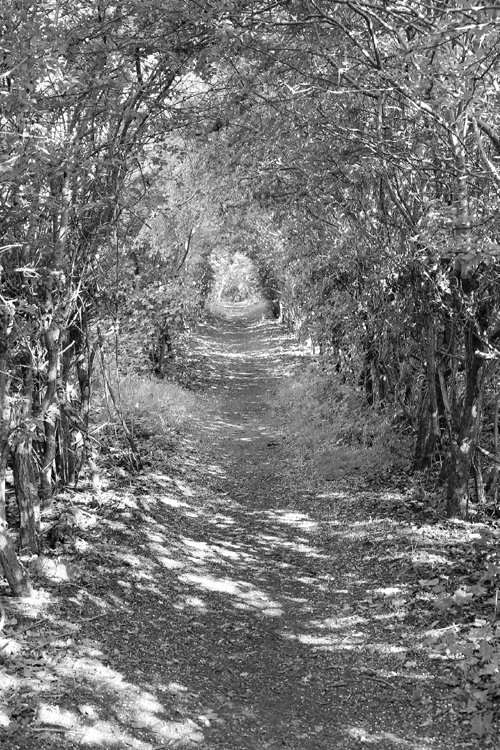
Prelude
When that April with its sweet showers
The drought of March hath pierced to the root,
Then people long to go on pilgrimages
And palmers seek on foreign strands
The distant saints, hallowed in sundry lands,
And specially, from every shires end
Of England, to Canterbury they wend
The holy blissful martyr there to seek,
To give them help when they are sick.
GEOFFREY CHAUCER,
The Prologue from The Canterbury Tales
FOR THREE NIGHTS AFTER MY RETURN I was troubled with the same dream. In this dream, I was entering the outskirts of Canterbury on foot. The towers of the cathedral stood proudly over the crooked roofs and chimney pots of the city. The cathedral, my destination and the end point of my pilgrimage, seemed tantalizingly close; but as I penetrated the warren of streets, I became confused and could find no way forward. Dark alleys and cramped staircases led to dead ends or locked doors. Ancient cobbled lanes looped back upon themselves and returned me to the place from where Id begun. Each night, I would awaken, troubled and frustrated, but no closer to the cathedral. I wondered what it meant. My wife explained the dreams as muscle memory.
Your body has become used to walking every day, she reasoned. And now that you are back at your desk, its protesting.
And it was true that when I awoke each morning, my legs, particularly my calf muscles, were stiff and sore, as if I had been walking all night. But I suspected something else was at work here. I had walked the old pilgrims trail from Winchester to Canterbury, that was certain, but had I truly arrived? Perhaps my pilgrimage to Canterbury was still incomplete.
The pilgrimage from Winchester to Canterbury along the old Pilgrims Way had been my idea, something to do with my father to mark his retirement. This was the traditional route followed by medieval pilgrims to the shrine of the murdered archbishop Saint Thomas Becket in Canterbury Cathedral. I knew the idea would appeal to him. He was an active member of his local Anglican church, and Canterbury Cathedral, our destination, was the mother ship of the global Anglican Communion. My father was also a keen outdoorsman. He loved to walk. It was from him that I learned to pitch a tent, build a fire, clean a fish, and paddle a canoe.
My own reasons for going were a bit more tenuous. Unlike my father, I had drifted away from the church. Growing up, I had been an altar boy, a choir member, a youth group leader and a Sunday school teacher. When I entered university, it was with the intention of enrolling in theology and becoming an ordained minister. But when push came to shove, I couldnt follow through, for I was beginning to have serious doubts about the things professed in the Apostles Creed. Did I believe in the bodily resurrection of the dead? No. Did I believe in the virgin birth or the doctrine of the Trinity? Not really. Did I even believe in God anymore? I wasnt sure. This knowledge didnt make me a happier person, and it certainly didnt make me feel intellectually superior to those who did believe. It made me sad. When Julian Barnes wrote I dont believe in God, but I miss him, I knew exactly what he meant.
But I had another motive for walking the Pilgrims Way: I wanted to spend more time with my father. We had seen very little of each other since I had left home following my parents divorce. It was not that I loved him less. It was just that I had been busy with my own life. Id finished university with degrees in English literature, education, and library science. I had been a teacher in Bhutan, China and the Canadian Arctic. But now that I had settled down and was married with three children of my own, I felt there was more my father and I had in common. Perhaps I could benefit from his experience. So I raised the idea of a pilgrimage to Canterbury, and to my delight he accepted.
But fate intervened. Within weeks of my broaching the subject, my father was dead of a massive heart attack. He died on a Sunday morning, while assisting a disabled parishioner with the elevator in the parish hall. One moment he was laughing and closing the elevator door behind him; the next moment he was dead. His heart had simply exploded.
So the idea of walking to Canterbury was put on a shelf, but never quite forgotten. Many years passed, and then in the spring of 2014 I began to reconsider the notion. Perhaps it was because I was finding life a bit overwhelming. I missed my old man, and I could have used his advice. I also sensed that I was approaching a mid-life crisis, with all of the clichd existential anguish it implied. I felt trapped in a job I did not enjoy, and my life lacked any meaningful purpose. I knew I had to do something or spontaneously combust.
Next page
